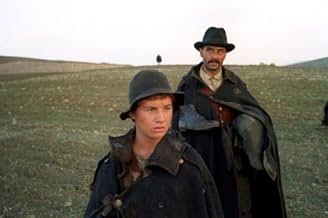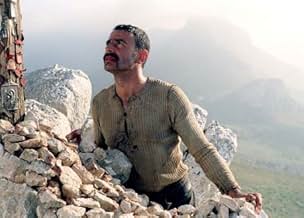Füge eine Handlung in deiner Sprache hinzuA Sicilian peasant begins the journey to the promised land and meets a beautiful Englishwoman. But neither is prepared for the harsh realities of Ellis Island. Can they make it through the g... Alles lesenA Sicilian peasant begins the journey to the promised land and meets a beautiful Englishwoman. But neither is prepared for the harsh realities of Ellis Island. Can they make it through the golden door to the America of their dreams?A Sicilian peasant begins the journey to the promised land and meets a beautiful Englishwoman. But neither is prepared for the harsh realities of Ellis Island. Can they make it through the golden door to the America of their dreams?
- Regie
- Drehbuch
- Hauptbesetzung
- Auszeichnungen
- 22 Gewinne & 29 Nominierungen insgesamt
- Il Gatto
- (as Paride Benassai)
- Dottore
- (as Giuseppe Cutino)
- Mangiapane
- (as Massimo La Guardia)
Empfohlene Bewertungen
The film begins with scenes in a poor, rural region of Sicily. We always hear that Sicily is a rocky island, but you won't really understand the implications of that phrase until you see the first half-hour of "The Golden Door."
The middle section of the film is devoted to the long voyage to the U.S. Most immigration films show us ten minutes of people in the third-class section becoming seasick, and then show us the Statue of Liberty. Not this movie--we get a sense for life below decks, and it isn't charming. (We never actually see the Statue of Liberty, either.)
Finally, the typical movie will give us another ten minutes of Ellis Island, and then the immigrants are walking through New York's Lower East Side. Not here--the Ellis Island experience occupies about one-third of the footage.
Vincenzo Amato is outstanding as Salvatore Mancuso, who is bringing his two sons and his mother to the new world. Charlotte Gainsbourg is equally good as Lucy Reed, a mysterious Englishwoman who also speaks fluent Italian.
There are some strange touches in the movie, especially the sound track with songs by Nina Simone. There must be some symbolism there, but I couldn't make sense of it.
Another reviewer has already pointed out that this film will do better viewed in a theater rather than on DVD. Still, large screen or small screen, it's worth seeking out.
I got drawn to this movie because it tells of immigrants from Sicily who traveled to America. I imagine much the same as my Grandfather did at that time. Travelling in steerage to provide ballast for the ships, I cannot imagine it was very comfortable, as shown in this film.
Laws restricting immigrants existed. I would guess that these laws were more strict on those who came from the Mediterranean and Africa. Immigrants had to be free from contagious diseases or hereditary infirmities. In the film, we see physical and mental exams, the latter because of the view that low intelligence is heritable. Single women could not enter the country, on the presumption that they would become prostitutes, so most married single men already in the country, as arranged beforehand, at Ellis Island before entry.
This is the story of a British immigrant (Charlotte Gainsbourg), who arranges to marry a poor Sicilian (Vincenzo Amato). He is trying to get his family through with a son that is mute and a mother (Aurora Quattrocchi) that is considered feeble-minded. She was fantastic in the role, by the way.
You will also see character actor, Vincent Schiavelli, in his next to the last appearance. I don't know if his last film has been released. He plays a matchmaker, and is also very good.
It was a strange, but enjoyable film. It's not for everyone, as I imagine those who don't have some interest in the immigrant experience would find it rather slow.
Guided by letters he read of immigrants sent to relatives who remained at home, Crialese identifies with those impoverished immigrants who were able to see the positive side of things beyond their ordeal. To Salvatore Mancuso (Vincenzo Amato) and his older son Angelo (Francesco Casisa), America is a distant dream that they know nothing about. After climbing a rocky mountain to pray to the saints for a sign, they are rewarded when they are shown post cards by Salvatore's younger son, Pietro (Filippo Pucillo), a deaf mute, that depict the new world as a land where they can bathe in rivers of milk, sit under a money tree, or harvest giant onions and carrots.
After disposing of their animals in exchange for shoes and suits, Salvatore, his two sons, and his elderly mother Fortunata (Aurora Quattrocchi) set out on their adventure with more hope than trepidation but the equation soon shifts the other way. As they board the boat and settle into their crowded third-class steerage compartments, the most-talked about scene in the film takes place. Using an overhead camera that shows masses of people standing, as the ship pulls away, the frame is divided into those aboard the ship and those waving goodbye from the dock and the way they are separated implies they are being torn asunder from everything familiar.
Aboard the ship is a mysterious English woman named Lucy (Charlotte Gainsbourg). Crialese does not reveal her past or the reason she is traveling to America but she seems to stand for the onset of the modern world they are entering. Though they eye each other cautiously, Lucy becomes interested in Salvatore and asks him to marry her in order to allow her to enter the country. The voyage is treacherous with a violent storm buffeting the ship. Shot in almost complete darkness, passengers in steerage are tossed against the side of the boat and, afterward, bodies lie tangled and twisted on the floor as if in a macabre Totentanz. The rite of passage through immigration processing at Ellis Island does not become any easier and Crialese attacks the way illiterate peasants, in the name of preserving "civilized" society, are forced to put puzzles together, perform mathematical tasks, and undergo humiliating medical examinations to prove they are "fit".
A marriage brokering ceremony feels like an auction block and the young women look despondent when they are matched with overweight middle-aged men. This is the only way they can enter the "Golden Door", however, since single women are rejected unless they have partners, ostensibly to prevent the threat of prostitution. Through the fog the immigrant's can barely see the land of milk and honey and there is no Statue of Liberty asking for the tired and the poor, the humbled masses yearning to breathe free. In their imagination, however, the river is still flowing, waiting for them to jump in. Though the ending is ambiguous and one door opens on to a blank wall, another door symbolizes a rebirth of the soul and the passage we must all take from the old world to the new.
The film opens in turn of the century Sicily as poverty stricken widower Salvatore Mancuso (Vincenzo Amato) and his brother Angelo (Francesco Casisa) climb a rocky hill to present their tokens to the cross to ask for a sign as to whether they should continue to struggle for existence on the island or go to America, the land of dreams. Mancuso's deaf mute son Pietro (Filippo Pucillo) runs to the top of the hill with postcards he has found with images of America (money growing on trees, fruits and vegetables larger than people, etc), and Salvatore accepts this as the sign that he should move his family to America. After convincing his reluctant mother Fortunata (Aurora Quattrocchi) and his sisters Rita (Federica De Cola) and Rosa (Isabella Ragonese) to make the trip, he sells his only possessions (two donkeys, goats, and rabbits) and the man with the boat arranges their trip, giving the family shoes, appropriate clothing, and instructions to board an ocean liner as third class passengers. As the Mancuso family prepares to board they are asked for a photograph, and as they pose behind a painted set, an Englishwoman Lucy/Luce (Charlotte Gainsbourg) walks into the photo as though she were part of this peasant family. Lucy cannot board the boat for America without male escort.
The voyage begins and Luce in her gentle way identifies with the Mancuso family, finally solidifying her safe passage by proposing to Salvatore to marry her 'for convenience, not for love' when they arrive in America. Through a violent storm and living conditions that are appalling poor, the multitude of third class passengers survive, bond, and eventually arrive at Ellis Island, believing their dream of America has been fulfilled. But everyone must pass harsh physical tests, de-lousing, and even intelligence testing to determine if they can enter America: the officials let them know that America does not want genetically inferior people entering the new world! Each woman must be selected by a man to marry on Ellis Island before they are allowed admission. The manner in which the Mancuso family remains united until a somewhat surprising ending is the closing of the tale.
Few of us understand the strict rules and harsh treatment immigrants face (or at least faced at the turn of the century) on Ellis Island, and if we do we have elected to submerge that information. THE GOLDEN DOOR presents the case for immigrants' struggles in a manner that not only touches our hearts but also challenges our acceptance of current immigration legislation. But all political issues aside, THE GOLDEN DOOR is first and foremost a film of enormous beauty, exquisite photography, deeply felt performances by a huge cast, and a very sensitively written and directed story. The is a film that deserves wide distribution, a movie that is a must see for everyone. Highly recommended. Grady Harp
3 / 5
Wusstest du schon
- WissenswertesDirector Emanuele Crialese personally chose every one of the 700 extras who appeared in the film. He said he was looking for people who could evoke the same facial expressions of the actual immigrants whose photographs Crialese came across when he was researching the film.
- Zitate
Lucy Reed: Madam? Madam. Could you lower your voice? I have a headache.
Fortunata Mancuso: Then have one! What do I care? Who does she think she is? This is the last thing I need. A journey like this ahead and she has a headache.
- SoundtracksFeeling good
Words and Music by Leslie Bricusse and Anthony Newley, Adapted and Performed by Nina Simone
Top-Auswahl
- How long is Golden Door?Powered by Alexa
Details
- Erscheinungsdatum
- Herkunftsländer
- Offizielle Standorte
- Sprachen
- Auch bekannt als
- 燦爛新人生
- Drehorte
- Produktionsfirmen
- Weitere beteiligte Unternehmen bei IMDbPro anzeigen
Box Office
- Budget
- 10.000.000 € (geschätzt)
- Bruttoertrag in den USA und Kanada
- 1.070.769 $
- Eröffnungswochenende in den USA und in Kanada
- 27.744 $
- 27. Mai 2007
- Weltweiter Bruttoertrag
- 7.228.273 $
- Laufzeit
- 1 Std. 58 Min.(118 min)
- Farbe
- Sound-Mix
- Seitenverhältnis
- 2.35 : 1




























